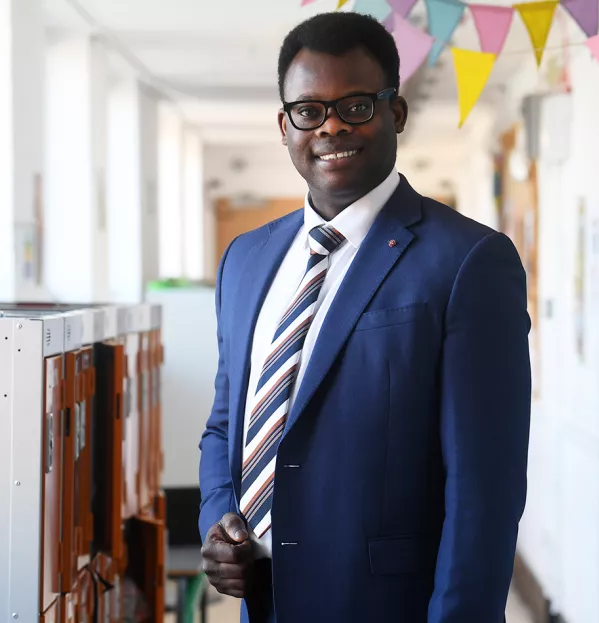10 questions with...Dr Jeffery Quaye

Dr Jeffery Quaye is the national director of education and standards of Aspirations Academies Trust.
Aspirations is a multi-academy trust (MAT) with 16 schools across the South West, London and the South East.
He spoke to Tes about the “constant pressure” facing school staff, the need for smaller MATs to join bigger trusts, his hope that AI will boost teacher recruitment - and how his mum was the first person to influence his career.
1. Who was your most memorable teacher and why?
My Year 3 teacher, Mrs Opare: she was inspirational, strict and caring, and she really ignited the fire in me to learn. One thing that stuck with me during my time at St Anthony’s Preparatory School was how she encouraged and pushed me to achieve my best. I always looked forward to lessons, particularly maths. I felt I had the opportunity to shine and have fun.
2. What were your best and worst aspects of school?
The best aspect of school is the opportunity for learning; it allows everyone to gain knowledge across a wide range of subjects and make great friends. Schooling exposed me to a range of experiences and extracurricular opportunities, which helped me foster an interest in social issues and develop a better understanding of the world we inhabit. I enjoyed maths and loved the academic challenge that the teachers provided.
Perhaps the least positive aspect of school was being in lessons I didn’t find interesting.
3. Why do you work in education?
Education is an equaliser and necessary to shape a better future for all. Through the teaching of mathematics, I’ve been able to transform the lives of my students. My involvement in education started during my first degree, when I had opportunities to tutor some of my coursemates. I noticed that I was able to explain complex concepts well and support others to overcome challenges. Having achieved a first-class honours in electrical and electronic engineering, I pursued a PGCE in secondary mathematics at the University of Hertfordshire.

In my mind, I was convinced that, by becoming a teacher, I would have that unique privilege to impact the future of many pupils positively. I have since had many opportunities to work with so many pupils and fantastic colleagues to improve standards in schools.
4. What are you proudest of in your career? What do you regret?
There have been many proud moments in my career, so it’s hard to choose.
In 2020, when I started my current role, we took on four schools that were in special measures, and the trust has grown by 25 per cent.
Working with principals and colleagues meant that, even with Covid disruptions, all of our schools have improved based on Ofsted’s recent inspections. Some of these previously “special measures” schools achieved “good” overall effectiveness with “outstanding” aspects.
5. What do you think are the best and worst aspects of our school system?
The best aspects of the school system include the opportunity to put pupils’ interests at the forefront of the work we do, providing the best education for all pupils in an inclusive culture.
There are always a wide range of professional development opportunities to upskill colleagues and further drive improvements in the quality of teaching and learning. Another positive feature is that, through the structure of the MAT, fundamental changes are made in terms of curriculum, school culture, staff wellbeing and the sharing of best practices widely.
However, a drawback of the system is the constant pressure staff have to work under in terms of pupils’ attendance, lack of support for pupils with special educational needs and disabilities (SEND), dealing with high numbers of pupils with mental health-related issues, challenges in recruiting staff and the widening disadvantage attainment gap.
While the sector is working to grapple with these issues, some of the complex issues need greater momentum from all stakeholders to see any movement of the dial.
6. What will our schools be like in 30 years’ time?
I think if we fast-forward 30 years, the school curriculum will be partly delivered with the help of artificial intelligence. This may address some of the pressing recruitment challenges. I think there will also be greater flexibility for staff working in schools. The education sector has the least proportion of staff on any flexible working arrangements and this will hopefully change for the better.

It is also worth pointing out that the use of educational research to inform practices in schools would become the norm. But we need to address the seemingly big divides between the competing schools of thought (progressives and traditionalists) so that ideas can converge to improve educational standards for pupils, which is all that every teacher wants.
Finally, I’m predicting increased diversity and true inclusion in all schools.
7. Your own teachers aside, who has influenced you the most?
There are many individuals who have influenced me in my career. My mum was the first in terms of my outlook and approach to my work. She instilled in me the values of hard work, humility and integrity.
During my year as a newly qualified teacher, my mentor, the late Jim Maddison, gave me the best experience as I started out. He was interested in not only my performance in the classroom but also my development. He would give me guidance and push me to take on other leadership roles.
The next influence in my career was Paula Kenning, who is the co-founder of the Aspirations Academies Trust. She is an individual who shaped my leadership and contributed most to my development as a leader. Paula has this determination to raise educational standards, and she is astute and great at what she does in her work.
Finally, Becky Francis, the CEO of the Educational Endowment Foundation, has been influential via her research on gender, social class and educational inequalities. She has been great at focusing the minds of educators on the educational outcomes of disadvantaged pupils.
8. If you became education secretary tomorrow, what would you do?
I would like to improve attitudes towards mathematics, from the early years, to increase pupils’ engagement with mathematics learning beyond post-16.
Another important pressing issue to tackle is working with the sector to improve outcomes for pupils with SEND. This is likely to require more funding for schools, but it is the right thing to do.
Assuming I was to stay in the education secretary role for a long time (a big “if”, since the Department for Education has seen the most changes in secretary of state recently), I would like to address the fragmentation of multi-academy trusts to ensure that small trusts with fewer than seven schools would join existing MATs to build strong families of schools.
9. Who’s made the biggest difference to education in the past 12 months?
The biggest difference in the past few months has been made by teachers, support staff and governors. Groups of people have worked tirelessly to improve the education that pupils experience in our schools.
More and more schools are dealing with complex social issues, which means staff are playing multiple roles to support families and pupils as we slowly move into the post-Covid era.
10. What is the most important lesson you’ve learned on the job?
The most important lesson I have learned is that standards are even more important if one wants to address social disadvantage. Championing high-quality education requires both a relentless focus on teaching and learning, and iterative processes to secure the necessary alignment of culture, systems and structures, thereby ensuring all pupils receive a high-quality education within the trust.
Also, challenging assumptions, and being prepared to actively listen in order to understand the schools and the communities we serve, are essential to driving educational success for pupils.
For the latest education news and analysis delivered every weekday morning, sign up for the Tes Daily newsletter
Keep reading for just £1 per month
You've reached your limit of free articles this month. Subscribe for £1 per month for three months and get:
- Unlimited access to all Tes magazine content
- Exclusive subscriber-only stories
- Award-winning email newsletters



